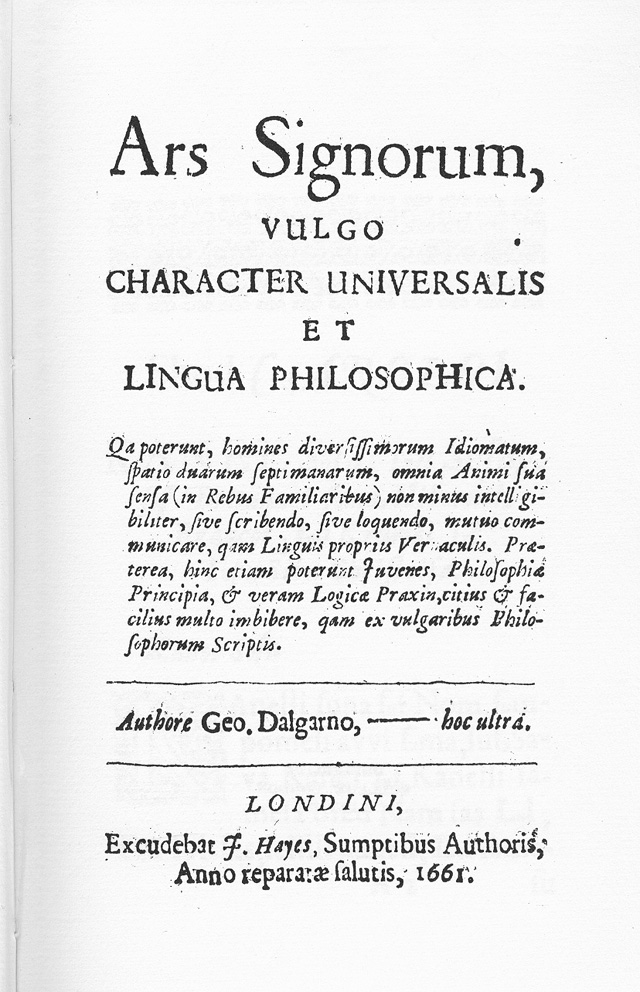George Dalgarno on:
[Wikipedia]
[Google]
[Amazon]
George Dalgarno (c. 1616 – 1687) was a Scottish intellectual interested in
 Dalgarno was also interested in constructing what he called a '
Dalgarno was also interested in constructing what he called a '
linguistic
Linguistics is the scientific study of human language. It is called a scientific study because it entails a comprehensive, systematic, objective, and precise analysis of all aspects of language, particularly its nature and structure. Linguis ...
problems. Originally from Aberdeen
Aberdeen (; sco, Aiberdeen ; gd, Obar Dheathain ; la, Aberdonia) is a city in North East Scotland, and is the third most populous city in the country. Aberdeen is one of Scotland's 32 local government council areas (as Aberdeen City), and ...
, he later worked as a schoolteacher in Oxford
Oxford () is a city in England. It is the county town and only city of Oxfordshire. In 2020, its population was estimated at 151,584. It is north-west of London, south-east of Birmingham and north-east of Bristol. The city is home to the ...
in collaboration with John Wilkins
John Wilkins, (14 February 1614 – 19 November 1672) was an Anglican clergyman, natural philosopher, and author, and was one of the founders of the Royal Society. He was Bishop of Chester from 1668 until his death.
Wilkins is one of the f ...
, although the two parted company intellectually in 1659.
Life
Dalgarno matriculated atMarischal College, Aberdeen
Marischal College ( ) is a large granite building on Broad Street in the centre of Aberdeen in north-east Scotland, and since 2011 has acted as the headquarters of Aberdeen City Council. However, the building was constructed for and is on long- ...
, in 1631. Subsequently, he was a schoolteacher in Oxford in the 1650s. In 1657, he was encouraged to upgrade a system of shorthand
Shorthand is an abbreviated symbolic writing method that increases speed and brevity of writing as compared to longhand, a more common method of writing a language. The process of writing in shorthand is called stenography, from the Greek ''ste ...
on which he was working, by Samuel Hartlib
Samuel Hartlib or Hartlieb (c. 1600 – 10 March 1662)
M. Greengrass, "Hartlib, Samuel (c. 1600–1662)", ''Oxford D ...
, to a more ambitious universal system and he published on the subject later the same year. This effort brought him into contact with members of the M. Greengrass, "Hartlib, Samuel (c. 1600–1662)", ''Oxford D ...
Oxford Philosophical Club
The Oxford Philosophical Club refers to a group of natural philosophers, mathematicians, physicians, virtuosi and dilettanti gathering around John Wilkins FRS (1614–1672) at Oxford in the period 1649 to 1660. It is documented in particular by J ...
, one of the precursors of the Royal Society
The Royal Society, formally The Royal Society of London for Improving Natural Knowledge, is a learned society and the United Kingdom's national academy of sciences. The society fulfils a number of roles: promoting science and its benefits, re ...
.
Works
Dalgarno was the author of ''Didascalocophus or the Deaf and Dumb man's tutor'' (1680), which proposed a totally new linguistic system for use bydeaf mute
Deaf-mute is a term which was used historically to identify a person who was either deaf and used sign language or both deaf and could not speak. The term continues to be used to refer to deaf people who cannot speak an oral language or have som ...
s.
 Dalgarno was also interested in constructing what he called a '
Dalgarno was also interested in constructing what he called a 'philosophical language
A philosophical language is any constructed language that is constructed from first principles. It is considered a type of engineered language. Philosophical languages were popular in Early Modern times, partly motivated by the goal of revising nor ...
', now more usually referred to as universal language
Universal language may refer to a hypothetical or historical language spoken and understood by all or most of the world's people. In some contexts, it refers to a means of communication said to be understood by all humans. It may be the idea of ...
. A modern translation of his '' Ars signorum'' (''Art of Signs'', 1661) was published in 2001 in an edition that also includes his autobiography and other manuscript writings.
Notes
References
* David Cram and Jaap Maat, (eds.), ''George Dalgarno on Universal Language: The Art of Signs (1661), The Deaf and Dumb Man's Tutor (1680), and the Unpublished Papers'', Oxford: Oxford University Press, 2001. *Umberto Eco
Umberto Eco (5 January 1932 – 19 February 2016) was an Italian medievalist, philosopher, semiotician, novelist, cultural critic, and political and social commentator. In English, he is best known for his popular 1980 novel ''The Name of the ...
, ''The Search for the Perfect Language'', Fontana Press, 1997, , pp. 228–237
External links
* * 1616 births 1687 deaths Alumni of the University of Aberdeen Constructed language creators Scottish linguists 17th-century Scottish people Scottish scholars and academics People from Aberdeen Scottish schoolteachers Scottish philosophers Scottish autobiographers 17th-century Scottish writers {{UK-linguist-stub